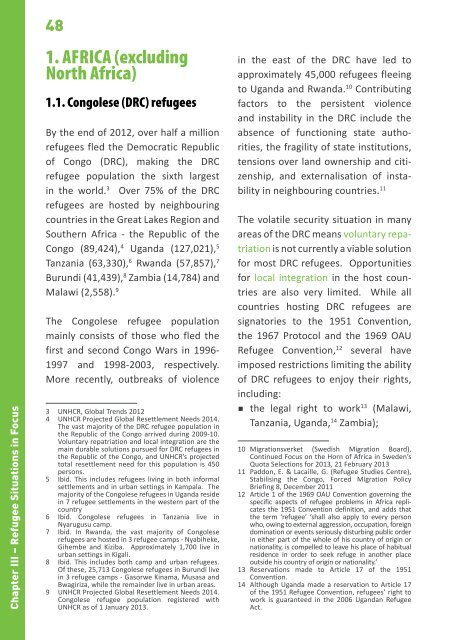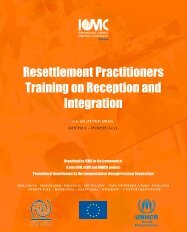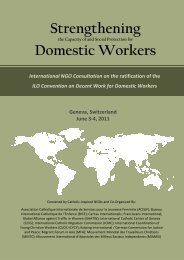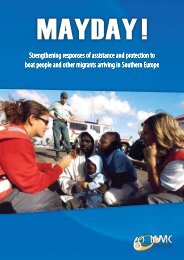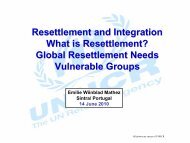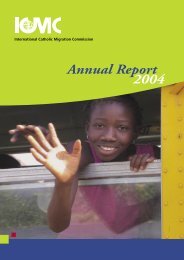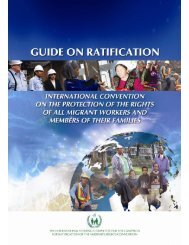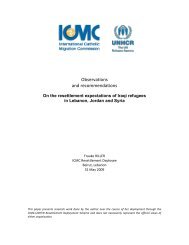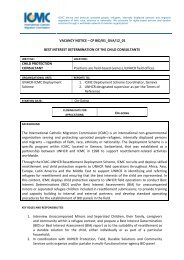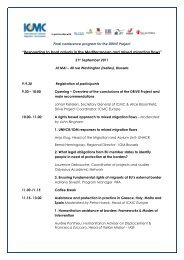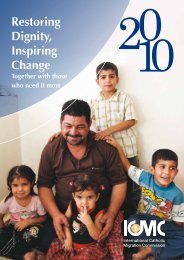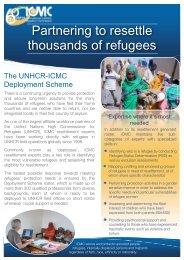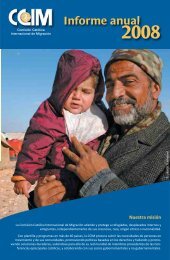ICMCEUROPE WelcometoEurope.pdf (5.89 MB)
ICMCEUROPE WelcometoEurope.pdf (5.89 MB)
ICMCEUROPE WelcometoEurope.pdf (5.89 MB)
Create successful ePaper yourself
Turn your PDF publications into a flip-book with our unique Google optimized e-Paper software.
Chapter III – Refugee Situations in Focus<br />
48<br />
1. AFRICA (excluding<br />
North Africa)<br />
1.1. Congolese (DRC) refugees<br />
By the end of 2012, over half a million<br />
refugees fled the Democratic Republic<br />
of Congo (DRC), making the DRC<br />
refugee population the sixth largest<br />
in the world. 3 Over 75% of the DRC<br />
refugees are hosted by neighbouring<br />
countries in the Great Lakes Region and<br />
Southern Africa - the Republic of the<br />
Congo (89,424), 4 Uganda (127,021), 5<br />
Tanzania (63,330), 6 Rwanda (57,857), 7<br />
Burundi (41,439), 8 Zambia (14,784) and<br />
Malawi (2,558). 9<br />
The Congolese refugee population<br />
mainly consists of those who fled the<br />
first and second Congo Wars in 1996-<br />
1997 and 1998-2003, respectively.<br />
More recently, outbreaks of violence<br />
3 UNHCR, Global Trends 2012<br />
4 UNHCR Projected Global Resettlement Needs 2014.<br />
The vast majority of the DRC refugee population in<br />
the Republic of the Congo arrived during 2009-10.<br />
Voluntary repatriation and local integration are the<br />
main durable solutions pursued for DRC refugees in<br />
the Republic of the Congo, and UNHCR’s projected<br />
total resettlement need for this population is 450<br />
persons.<br />
5 Ibid. This includes refugees living in both informal<br />
settlements and in urban settings in Kampala. The<br />
majority of the Congolese refugees in Uganda reside<br />
in 7 refugee settlements in the western part of the<br />
country<br />
6 Ibid. Congolese refugees in Tanzania live in<br />
Nyarugusu camp.<br />
7 Ibid. In Rwanda, the vast majority of Congolese<br />
refugees are hosted in 3 refugee camps - Nyabiheke,<br />
Gihembe and Kiziba. Approximately 1,700 live in<br />
urban settings in Kigali.<br />
8 Ibid. This includes both camp and urban refugees.<br />
Of these, 25,713 Congolese refugees in Burundi live<br />
in 3 refugee camps - Gasorwe Kinama, Musasa and<br />
Bwagiriza, while the remainder live in urban areas.<br />
9 UNHCR Projected Global Resettlement Needs 2014.<br />
Congolese refugee population registered with<br />
UNHCR as of 1 January 2013.<br />
in the east of the DRC have led to<br />
approximately 45,000 refugees fleeing<br />
to Uganda and Rwanda. 10 Contributing<br />
factors to the persistent violence<br />
and instability in the DRC include the<br />
absence of functioning state authorities,<br />
the fragility of state institutions,<br />
tensions over land ownership and citizenship,<br />
and externalisation of instability<br />
in neighbouring countries. 11<br />
The volatile security situation in many<br />
areas of the DRC means voluntary repatriation<br />
is not currently a viable solution<br />
for most DRC refugees. Opportunities<br />
for local integration in the host countries<br />
are also very limited. While all<br />
countries hosting DRC refugees are<br />
signatories to the 1951 Convention,<br />
the 1967 Protocol and the 1969 OAU<br />
Refugee Convention, 12 several have<br />
imposed restrictions limiting the ability<br />
of DRC refugees to enjoy their rights,<br />
including:<br />
• the legal right to work 13 (Malawi,<br />
Tanzania, Uganda, 14 Zambia);<br />
10 Migrationsverket (Swedish Migration Board),<br />
Continued Focus on the Horn of Africa in Sweden’s<br />
Quota Selections for 2013, 21 February 2013<br />
11 Paddon, E. & Lacaille, G. (Refugee Studies Centre),<br />
Stabilising the Congo, Forced Migration Policy<br />
Briefing 8, December 2011<br />
12 Article 1 of the 1969 OAU Convention governing the<br />
specific aspects of refugee problems in Africa replicates<br />
the 1951 Convention definition, and adds that<br />
the term ‘refugee’ ‘shall also apply to every person<br />
who, owing to external aggression, occupation, foreign<br />
domination or events seriously disturbing public order<br />
in either part of the whole of his country of origin or<br />
nationality, is compelled to leave his place of habitual<br />
residence in order to seek refuge in another place<br />
outside his country of origin or nationality.’<br />
13 Reservations made to Article 17 of the 1951<br />
Convention.<br />
14 Although Uganda made a reservation to Article 17<br />
of the 1951 Refugee Convention, refugees’ right to<br />
work is guaranteed in the 2006 Ugandan Refugee<br />
Act.


